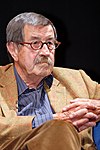 Günter Grass
Günter Grass


German novelist, poet, playwright, illustrator, graphic artist, and sculptor (1927-2015).
Born October 16th, 1927 in Gdańsk, Free City of Danzig. [ref]
Died April 13th, 2015 at 87 years old in Lübeck (infection). [ref]
Günter Grass, one of the most influential writers of post-WWII Germany, passed away on April 13, 2015 in Lübeck, Germany, at the age of 87. Günter was born in 1927 in the Free City of Danzig, now known as Gdansk, Poland. He was a novelist, poet, playwright, sculptor and essayist. From time to time, he also had been an active political campaigner, who, in 2008, campaigned for the federal elections on behalf of the Social Democratic Party. In 1959, Günter won the Nobel Prize in Literature for his most famous novel, The Tin Drum. In it, Grass portrayed the harshness of life under totalitarian regimes and its impact on humans, and was considered one of the leading works of literature of the 20th century. In addition to The Tin Drum, Günter also wrote Dog Years, Crabwalk and Fictitious Bras, amongst others. Günter was found guilty in the 1950s of serving in the Nazi Waffen-SS during the wartime, although he maintained that he voluntarily joined the organization and was released soon after. He was active in the Anti-War movement in the 60s and 70s, which led to life long friendships with some of Germany's leading radical intellectuals, poets and philosophers. Günter will be remembered for being a true champion of German literature and for his role in exposing and condemning the horrors of war. He was a giant of German and European letters, whose talent and polticial conscience have left an indelible impression on the world. He will be deeply missed.
Death comes to all, but great achievements build a monument which shall endure until the sun grows cold. Ralph Waldo Emerson